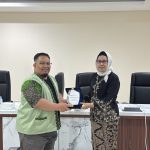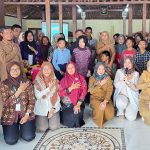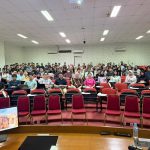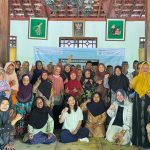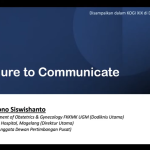The Center for Bioethics and Medical Humanities (CBMH) history was established in 1997 as Bioethics and Medical Humanities Team, led by Prof. dr. Yati Soenarto, SpA(K), PhD. The team aimed to improve moral, ethical, and behavioral aspects among the medical students. The initial strategy was involving interdisciplinary experts, i.e. medicine, philosophy, psychology, social-humanities, civic, law, religion, which soon transformed into what the center is currently promoting, a transdisciplinary approach. In its further development, the center has evolved into an innovative and productive center with the main vision “to improve bioethics and medical humanities education, research, and service in order to create highly qualified moral and humane practitioners”. The center aspires to achieve the vision through missions in the following area:
- Education (integrating bioethics and medical humanities into curriculum)
- Research (conducting local, regional, and international research on bioethics and medical humanities)
- Service (training and educating professionals and community in bioethics and medical humanities)
Bioethics training for health professionals have been conducted and joined by participants from around the country. With a distinct approach to Bioethics, the aspects of HELP have been promoted as a strategy unique to CBMH. It emphasizes on cultivating Humanities as the basic starting point for Ethical skills, whilst balancing with proper understanding of Legal aspects, and Professionalism in the framework. Aspiring for global participation, the center has made significant numbers of contributions on bioethics development, through various approaches in the form of hosting international conferences, trainings, collaborative projects and research. These efforts encourage and empower Asia-Pacific Innitiatives in enriching bioethics developement in this global society. In line with that spirit, the center was appointed as the leading coordinator for the International Consortium on Bioethics and Humanities, hosting the Asia-Pacific (Trans-nations) bioethics collaboration (initiated by Indonesia, Taiwan, Malaysia, and Australia) Those achievements mentioned above were not the main goals nor the finish line. In fact those propel further our motivation and spirits to keep going, as the journey is far from ending. The new chapter has just begun focusing on the following main concerns. First, bioethics capacity building for health professionals, through formal education (graduates and postgraduates) and continuing professional development and training (certified courses, etc). Secondly, to infuse and cultivate ethical values into every science and technology development, including but not limited to health area. Last but most importantly is contributing for nations’s welfare through building and investing transcultural and transdisciplinary attitudes, so that every stakeholder/policymakers in this country would have the skills to do science diplomacy, for the sake of defending nation’s interest, assets and resources. We still hold many plans for the future. The most strategic is the establishment of Department of Bioethics and Medical Humanities at the Faculty of Medicine, the International Bioethics Postgraduate Programs in UGM and hosting key meetings, i.e. the the JBHKI 8th National meeting and the 17th Asian Bioethics Conference in 2016.

